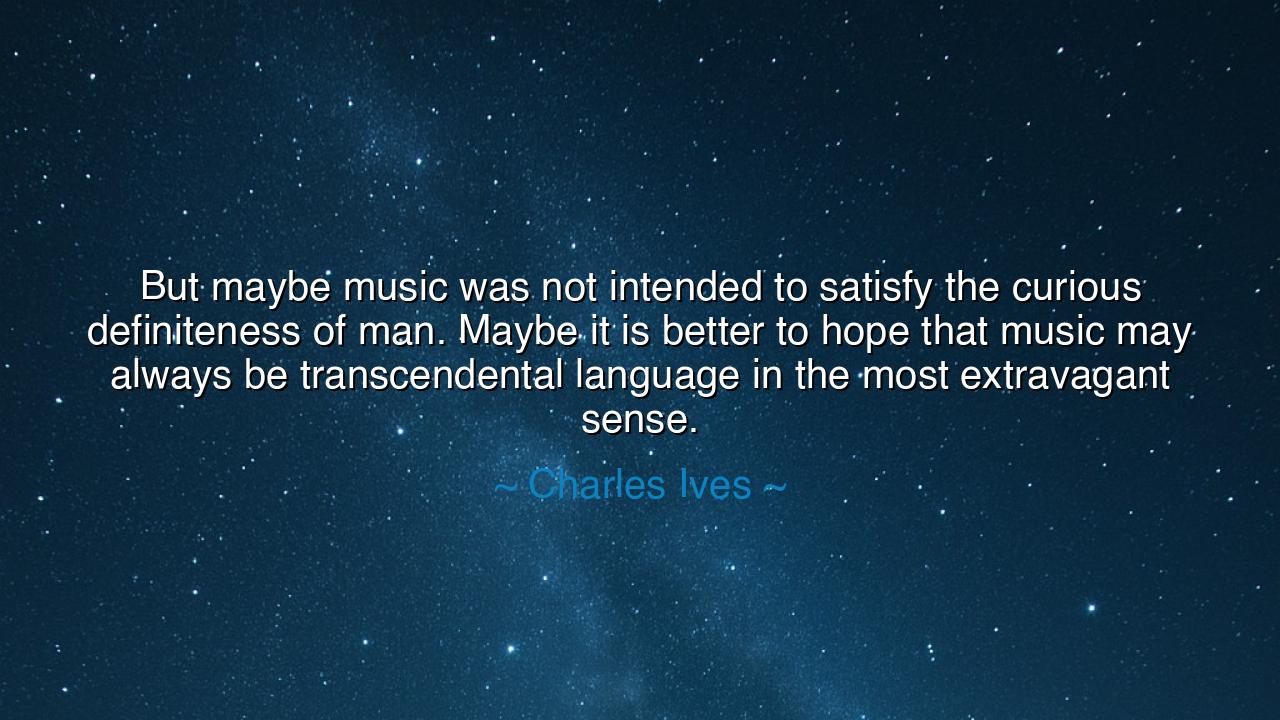
But maybe music was not intended to satisfy the curious
But maybe music was not intended to satisfy the curious definiteness of man. Maybe it is better to hope that music may always be transcendental language in the most extravagant sense.






In the profound and visionary words of Charles Ives, the composer who dared to make dissonance divine, there lies a truth that speaks not only to the musician, but to every soul that seeks meaning: “But maybe music was not intended to satisfy the curious definiteness of man. Maybe it is better to hope that music may always be transcendental language in the most extravagant sense.” In these words, Ives lifts music beyond the realm of sound and science, into the sphere of the sacred. He suggests that the purpose of music is not to explain, but to reveal; not to define, but to awaken. Music, he teaches, is not a riddle to be solved by the mind, but a mystery to be felt by the spirit.
The origin of this quote emerges from Ives’s lifelong struggle between order and freedom, reason and transcendence. Born in America during the late nineteenth century, he stood at the crossroads between tradition and revolution. Trained in the rigid forms of European composition, he rebelled against their boundaries. He blended hymns with chaos, marching bands with silence, atonality with prayer. Critics dismissed him, yet he persisted — not for fame, but for truth. For Ives believed that music, like life itself, should not be imprisoned by convention. He sought to express the infinite — the trembling between heaven and earth — through sound. And in this pursuit, he discovered what he called transcendental language, that which speaks from soul to soul without words.
The phrase “curious definiteness of man” reveals his understanding of humanity’s endless hunger to categorize and control. Man, ever curious, desires to measure even the mysteries of the heart, to capture beauty as if it were a specimen under glass. Yet Ives warns that such definiteness is the death of wonder. For what happens when we dissect the songbird to understand its tune? The song is lost, the mystery destroyed. So too with music, which lives not in analysis, but in experience. The ancients knew this well: the Pythagoreans, who found divine harmony in the movement of the stars, and the Sufis, who whirled to the music of creation itself. They did not ask what music meant — they became it.
Consider the story of Beethoven, who composed his Ninth Symphony while deaf. He could not hear a single note of the orchestra that thundered before him. Yet within him resounded a music beyond sound — a transcendental symphony of faith and joy. When the final chorus of “Ode to Joy” burst forth, it was not the product of logic, but of revelation. Beethoven had moved beyond the definiteness of hearing into the realm of the spirit, where music becomes the purest expression of the divine within man. This is what Ives meant when he spoke of music as “transcendental language in the most extravagant sense” — a language so vast it defies containment, so sincere it surpasses reason.
For Ives, music was not the servant of pleasure or perfection, but the instrument of truth. It was the echo of eternity within the finite heart. To him, even dissonance — the clash of tones, the noise that offends the ear — was sacred, because it mirrored the human condition: our longing, our contradictions, our chaos. In this, he was like the mystics of old, who found divinity not in the absence of suffering, but in its transformation. Music, he believed, should awaken the listener not to comfort, but to awareness — to the pulse of something greater than ourselves.
And yet, Ives’s vision was not detached from life. He knew that true transcendence is not escape, but engagement — the merging of heaven and earth, the sacred and the ordinary. The “extravagance” of music, as he called it, was not found in ornamentation, but in its boundless reach. It could move from the simplest lullaby sung to a child to the grandest symphony that shakes the world, and in both could be found the same essence — love, sorrow, faith, and yearning. Thus, he invites us to see music not as entertainment, but as revelation; not as sound, but as communion.
So, my child of tomorrow, learn from Charles Ives: do not seek to define what should be felt, nor to confine what was meant to soar. Let your heart, like his, find beauty in dissonance, and meaning in mystery. When you hear music, do not ask, “What does it mean?” Ask instead, “What does it awaken in me?” Listen not with the mind alone, but with the soul. For the highest truths cannot be spoken — they can only be sung.
For as Ives teaches, music is not a mirror for understanding, but a window for transcendence. It is the divine whisper that moves through all creation, calling us to remember that we are more than flesh and reason. When you hear that whisper — in the wind, in the silence, in the beating of your own heart — do not analyze it. Simply listen. For in that moment, you will touch the infinite, and you will know, without words, the extravagant language of the eternal.






AAdministratorAdministrator
Welcome, honored guests. Please leave a comment, we will respond soon